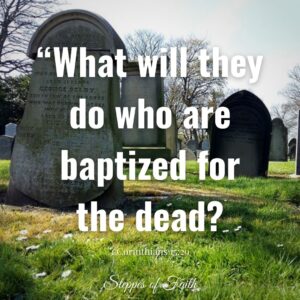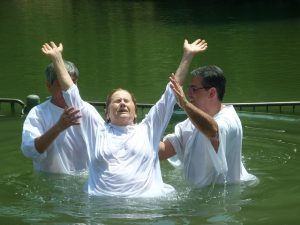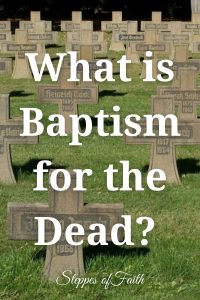
“What will they do who are baptized for the dead?” 1 Corinthians 15:29
In his first letter to the Corinthians, the apostle Paul deals with various issues occurring within the church. The members were having difficulty leaving their pagan ways behind, causing many of them to stall in their spiritual growth. Their struggles prompted Paul to write several letters to correct their behavior and move them toward a godly lifestyle.
Some of the issues addressed in 1 Corinthians are the cross and Christ’s resurrection, the transforming power of salvation, sanctification, the role of women in God’s kingdom, marriage and divorce, love, and unity of the church. Paul also deals with the doctrine of baptism and how it applies to the dead.
Some people in the church believed they could posthumously save someone from sin and help them to heaven by vicariously baptizing themselves on that person’s behalf. Certain modern faiths, most notably Mormons, believe and practice this method of baptism today.
Some argue the Corinthian church was not practicing substitutionary baptism, merely only acknowledging the idea. However, people in the community were baptizing this way, and the practice became a stumbling block for others. Therefore, the apostle Paul attempted to warn the church and correct this unbiblical tradition in 2 Corinthians 15:29.
The Risen Christ
In 1 Corinthians 15, Paul mainly teaches about Jesus as the risen Savior, that He died for our sins, was buried, and rose again three days later (v3-4). He was seen alive again by Cephas, the twelve disciples, and over 500 people at the same time. He was then seen by His half-brother, James, the apostles, and lastly, Paul himself.
These people personally saw Jesus alive, which is why Paul goes on to teach that because Jesus is resurrected, we too will be resurrected one day. Conversely, if anyone believes there is no resurrection of the dead, then Jesus is also not risen (v13).
“If the dead do not rise, then Christ is not risen.” (v16)
“And if Christ is not risen, then our preaching is empty, and your faith is also empty.” (v14)
Paul then argues that if the dead do not rise, why does anyone believe a substitutionary baptism will accomplish anything?
“What will they do who are baptized for the dead if they do not rise at all? Why then are they baptized for the dead? And why do we stand in jeopardy every hour?” (v29-30)
Paul’s question has perplexed scholars for centuries. What exactly does the phrase “baptized for the dead” mean?
False Baptism Teaching
According to Scripture (1 Peter 3:21), baptism is a public confession of our faith in Jesus Christ as our Lord and Savior. It is an outward testimony of the inward change in a believer’s life as well as an act of obedience after receiving salvation.
“Then those who gladly received [Peter’s] word were baptized.” Acts 2:41
The practice of baptism is regarded differently in different faiths. Religions other than Christianity teach that baptism is required for salvation, essentially claiming that Jesus’ atoning death was not sufficient. Such was the case in Corinth and a common belief in pagan Greek religions.
Teachers before Paul falsely taught that baptism, whether during one’s life or afterward, was necessary for that person to go to heaven. A reference to this practice is only mentioned here in 1 Corinthians 15:29. Nowhere else in the Bible can we find the idea of baptism for the dead. On the contrary, the Bible strongly emphasizes no one can receive salvation and go to heaven except by the gift of God’s grace (Ephesians 2:8; Romans 3:28; 4:3; 6:3-4).
The prophet Ezekiel teaches we do not have any effect on anyone who has died. We cannot bear their guilt nor their righteousness. We are accountable only to ourselves.
“The soul who sins shall die. The son shall not bear the guilt of the father, nor the father bear the guilt of the son. The righteousness shall be upon himself, and the wickedness of the wicked shall be upon himself.” Ezekiel 18:20
The author of Hebrews then tells us,
“And as it is appointed for men to die once, but after this the judgment.” Hebrews 9:27
When we die, we are instantly in the presence of the Lord.

Hades and Sheol
Jesus also spoke of the chasm between the living and the dead.
In Luke 16:19-30, Jesus is telling the parable of the rich man and Lazarus (not the Lazarus He raised from the dead in John 11). Both men died. Angels carried Lazarus to heaven, but they delivered the rich man to Hades.
Jesus uses the term Hades to illustrate the separation of the dead from the living in a way the Pharisees could understand. Both the Old Testament and the Tanakh refer to it as a place for the dead (Psalm 6:5, 88:6,12, 143:3; Habakkuk 3:5; Isaiah 38:10,18; Job 7:9, 17:13-16, et al.). God held the souls in Hades (or Sheol in Hebrew) until their resurrection in the Rapture (1 Thessalonians 4:16), something the Pharisees and many Jews were familiar with.
[READ MORE: What is Sheol? (Desiring God)]
The New Testament also mentions Hades (Luke 16:23; Revelation 1:18, 6:8, 20:13-14). The book of Revelation refers to it because John’s prophetic vision showed him something that resembled his Jewish learning. Every time John saw death, he related it to Hades.
“Then Death and Hades were cast into the lake of fire.” Revelation 20:14
Death is real, and Hades was too at one time, but now it no longer exists except in rabbinical and Mormon tradition. After Jesus came, He destroyed Hades as well as Sheol and any notions of a purgatory. Paul confirms this in 2 Corinthians 5:8.
“We are confident, yes, well pleased rather to be absent from the body and to be present with the Lord.”
Jesus Holds All Authority
No intermediary place for the dead exists anymore because of Jesus’ work on the cross. By His death and resurrection, He has conquered death forever. Satan no longer holds any power over it. Jesus has complete authority, which is why Revelation 20:14 says He will cast death and Hades “into the lake of fire.”
Because of Jesus’ power over death, we can declare with Paul in confidence, “Absent from the body, present with the Lord.” And since we immediately go into the Lord’s presence when we die, others cannot baptize us. Likewise, we cannot become a substitution for someone else, which means posthumously baptizing them does nothing. Only the Lord can bring us to heaven.
We cannot baptize the dead. But we can put our hope in the realization that one day we (those who have put their faith in Jesus) will be resurrected and dwell with the Lord forever.

The Importance of Baptism
Since no one can baptize us after our death, it is important to be baptized as soon as possible after receiving salvation. Many people have their infant baptized, but this is not the kind of baptism the Bible teaches. A baby cannot have any knowledge or understanding of the gospel, so baptism is only for those who can.
Proper baptism is by full immersion in water, just as John the Baptist baptized Jesus in Matthew 3 and Mark 1.
“When He had been baptized, Jesus came up immediately from the water.” Matthew 3:10
“And immediately, coming up from the water, He saw the heavens parting and the Spirit descending upon Him like a dove.” Mark 1:10
Water immersion has two purposes. It is both a public confession of our faith in Jesus Christ plus how we identify with His death, burial, and resurrection. Paul writes about it in his letter to the Jews in Rome.
“Or do you not know that as many of us as were baptized into Christ Jesus were baptized into His death? Therefore, we were buried with Him through baptism into death that just as Christ was raised from the dead by the glory of the Father, even so, we also should walk in the newness of life. For if we have been united together in the likeness of His death, certainly we also shall be in the likeness of His resurrection.” Romans 6:3-5
The water symbolically cleanses us from our sins. We proclaim we are leaving our sinful life behind and picking up our cross to follow Jesus. We are theoretically passing, as they say, from death to life, a life in the presence of the Lord.
Have you accepted God’s gift of grace? Do you believe Jesus is the promised Messiah who died on a cross to save us from sin? Do you believe He rose again three days later? If you do, salvation is waiting for you.
